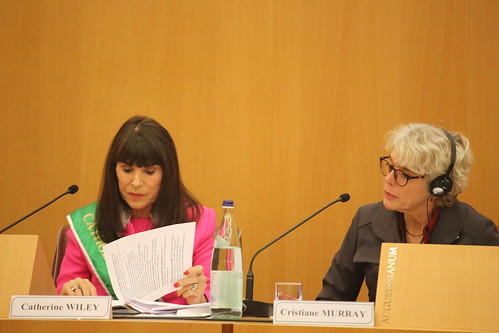Elderly
Focus on the family
The second session of the first international conference, “The Richness of Many Years of Life”

“The juxtaposition of the elderly and the family is fundamental for understanding the phenomenon of aging in a population that is ever more numerous, provided that it is clarified that when we speak of the family we are referring to the many generations of which it is comprised, and not only of the family with which we share a residence.” With this, Donatella Bramanti of the Università Cattolica del Sacro Cuore opened the new work day of the conference “The Richness of Many Years of Life” at the Augustinianum. The morning session was centered on the theme, “The Family and the Elderly.” “The elderly,” said Bramanti, “today constitute an important resource both within families and in society as a whole, as long as they succeed in living out this transition in a positive way, together with the people around them. For this,” she explained, “it is important to observe closely how the family perceives this phase as they are progressively approaching it, and what the warning signs (if they can be read) are of this new condition. In fact, it is only when one feels the discomfort of the challenge of a change,” she concluded, “that a period of searching for a new balance can begin.”
Certain that “the coexistence across different ages cannot be improvised,” Maria Voce, president of the Focolare Movement, said, “It is a way of openness to dialogue which must be captivating in an ever-new way even for adults, as a continuing education. It is based on understanding, which is a light because it gives meaning to life and opens new horizons.” In all this, according to Voce, “the Pope’s call to overcome indifference and to regard each other with esteem—the young towards the elderly and vice versa—goes beyond prejudices and clichés, indicates and gives the impression of a real sign of the times.”
Finally, Maria Voce outlined some “ways to go” with a view towards dialogue across generations: “Leave your impressions and stereotypes, and face the challenges of untried ideas, to promote a dynamic sharing and a lived reciprocity.”
Monique Bodhuin, president of “Vie Montante Internationale,” underscored how the elderly are “witnesses, caretakers, and custodians of the roots of faith among the younger generations and in society in general. At the same time, they are also the recipients of the pastoral care of the Church, which must assume the obligation of assisting them in their conversion and coming to their aid with love in order to bring them out of the existential peripheries of their existence.” In conclusion, the president dwelt on evangelization, “a path to walk together, under the banner of relationship and encounter.”
Speaking of the need to “encourage prayer within our families,” Catherine Wiley, president of the Catholic Grandparents Association, in the course of the morning round table discussion stated, “This will help them to find ways to nurture mutual respect and love and an openness to receive from our elderly the gifts of their wisdom and experience. Technology today, while it can be at times intrusive, can be the crucial link for families that are separated by distance.”
Giovanni Paolo Ramonda, president of the Pope John XXIII Association, said that “family law should be drafted with the elderly and children in mind. A people can only be considered humane if they do not leave behind the most vulnerable—or worse still, accompany them to a deliberately premature death. A society is only fully human if it takes care of the weak, the sick, the suffering, and if it channels its resources towards those families that have within them members who are sick, elderly, or even
terminally ill. The scandal of privilege and waste,” he continued, “must be cancelled in favor of these parts of society, in order to be on the side of those who cannot care for themselves.” Ramonda hoped that every elderly person “would be able to spend their old age at home with their own family, encouraging at-home care and educational economic support; and if this is not possible, developing systems of familial caretaking to allow the elderly person to reclaim their role as a grandparent, and along with this the possibility of loving and being loved. The elderly,” he concluded, “are our roots, the custodians of memory, of history, the connecting link in the circle of life.”
30 January 2020

Rediscovering and proclaiming hope again
Card. Kevin Farrell, prefect of the Dicastery ...
Read all >
Evangelizing WITH the Families of Today and Tomorrow: Ecclesiological and Pastoral Challenges
“Dear brothers and sisters, I am pleased ...
Read all >
Hope Lived and Proclaimed. The Gift of the Jubilee for Ecclesial Communities
Evangelization and formation in the light ...
Read all >

